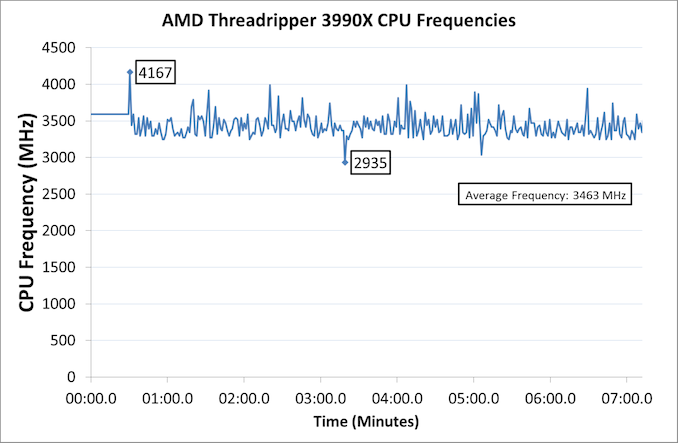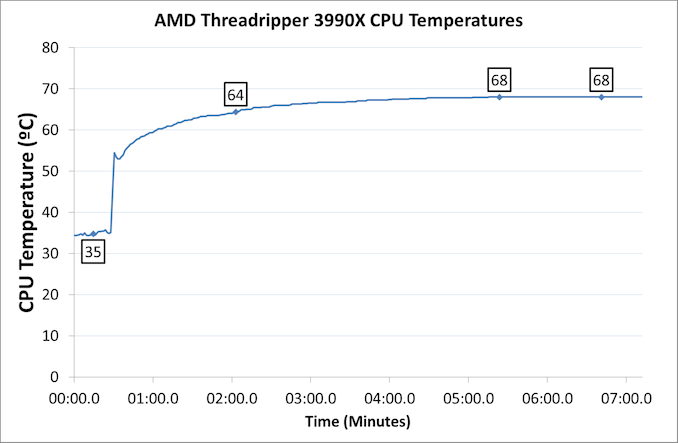The 64 Core Threadripper 3990X CPU Review: In The Midst Of Chaos, AMD Seeks Opportunity
by Dr. Ian Cutress & Gavin Bonshor on February 7, 2020 9:00 AM ESTFrequency, Temperature, and Power
A lot of questions will be asked about the frequency, temperature, and power of this chip: splitting 280W across all the cores might result in a low all-core frequency and require a super high current draw, or given recent reports of AMD CPUs not meeting their rated turbo frequencies. We wanted to put our data right here in the front half of the review to address this straight away.
We kept this test simple – we used our new NAMD benchmark, a molecular dynamics compute solver, which is an example workload for a system with this many cores. It’s a heavy all-core load that continually cycles around the ApoA1 test simulating as many picoseconds of molecular movement as possible. We run a frequency and thermal logger, left the system idle for 30 seconds to reach an idle steady state, and then fired up the benchmark until a steady state was reached.
For the frequencies we saw an ‘idle’ of ~3600 MHz, which then spiked to 4167 MHz when the test began, and average 3463 MHz across all cores over the first 6 minutes or so of the test. We saw a frequency low point of 2935 MHz, however in this context it’s the average that matters.
For thermals on the same benchmark, using our Thermaltake Riing 360 closed loop liquid cooler, we saw 35ºC reported on the CPU at idle, which rose to 64ºC after 90 seconds or so, and a steady state after five minutes at 68ºC. This is an ideal scenario, due to the system being on an open test bed, but the thing to note here is that despite the high overall power of the CPU, the power per core is not that high.
This is our usual test suite for per-core power, however I’ve condensed it horizontally as having all 64 cores is a bit much. At the low loads, we’re seeing the first few cores take 8-10W of power each, for 4.35 GHz, however at the other end of the scale, the CPUs are barely touching 3.0 W each, for 3.45 GHz. At this end of the spectrum, we’re definitely seeing AMD’s Zen 2 cores perform at a very efficient point, and that’s even without all 280 W, given that around 80-90W is required for the chipset and inter-chip infinity fabric: all 64 cores, running at almost 3.5 GHz, for around 200W. From this data, we need at least 20 cores active in order to hit the full 280W of the processor.
We can compare these values to other AMD Threadripper processors, as well as the high-end Ryzens:
| AMD Power/Frequency Comparison | |||||||
| AnandTech | Cores | CPU TDP | 1-Core Power |
1-Core Freq |
Full Load Power/core |
Full Load Freq |
|
| 3990X | 64 | 280 W | 10.4 W | 4350 | 3.0 W | 3450 | |
| 3970X | 32 | 280 W | 13.0 W | 4310 | 7.0 W | 3810 | |
| 3960X | 24 | 280 W | 13.5 W | 4400 | 8.6 W | 3950 | |
| 3950X | 16 | 105 W | 18.3 W | 4450 | 7.1 W | 3885 | |
The 3990X exhibits a much lower power-per-core value than any of the other CPUs, which means a lower per-core frequency, but it isn’t all that far off at all: less than half the power for only 400 MHz less. This is where the real efficiency of these CPUs comes into play.













279 Comments
View All Comments
extide - Friday, February 7, 2020 - link
"All the Threadripper 3000 family CPUs support a total of 64 PCIe 4.0 lanes from the CPU, and another 24 from the chipset (however each of these use four of them to communicate with each other)."I thought they bumped the CPU <--> Chipset connection up to 8 lanes on this platform. Is that a typo or am I confused?
Slash3 - Friday, February 7, 2020 - link
You are correct.Valantar - Friday, February 7, 2020 - link
Great review, love the broad perspective and testing across different OSes! An error though: "All the Threadripper 3000 family CPUs support a total of 64 PCIe 4.0 lanes from the CPU, and another 24 from the chipset (however each of these use four of them to communicate with each other" - this is wrong for TRX40; the CPU and chipset both have 8 PCIe lanes dedicated to communication that do not count in the total. Source: https://www.anandtech.com/show/15121/the-amd-trx40...dwade123 - Friday, February 7, 2020 - link
Terrible performance scaling from 32 cores to 64 cores. Even prosumers won’t benefit much from that many cores. And the price tag... Ouch. 3000 series will be the worse selling Threadripper easily.RSAUser - Friday, February 7, 2020 - link
Scaling looks pretty good, take the clock speed difference into account and a little bit extra fo thread spawning and control, and it looks like a good 80%+ scaling for most multi threaded tasks.FunBunny2 - Friday, February 7, 2020 - link
" games have not included software renderers for ~two decades."clearly, only those with embarrassingly parallel problems will benefit from these sorts of chips. and, by embarrassingly parallel one means intra-application, and not just lots o innterWeb sessions.
FunBunny2 - Friday, February 7, 2020 - link
oops. not the right quote: "3000 series will be the worse selling Threadripper easily."Kjella - Friday, February 7, 2020 - link
Obviously this particular processor is a low volume product, but they needed a workstation platform between AM4 and Epyc and since it's a halo product of a server chip it probably didn't cost AMD much to add it to the lineup. The biggest clue is probably that there's no 3980X, they're not fleshing out the lineup just making one extreme processor for bragging rights.But I wouldn't underestimate the number of people who can say "You're paying me >$100k/year to do this, if I'm 5% more efficient with a $4k processor it's worth it". They exist even though they're obviously not a mass market it's not just to showboat. That's on top of the PR value.
FunBunny2 - Friday, February 7, 2020 - link
"You're paying me >$100k/year to do this,"at some point even the self-absorbed CEO class will realize that lots of those folks are engaged in non-producing overhead tasks. somethings are just not worth the costs saved.
monkeydelmagico - Friday, February 7, 2020 - link
I think it's really cool that Ian got to set the price on this chip. Kudos.